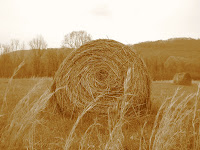
Dear friends,
From December 6 - 19, the United Nations Framework Convention on Climate Control will convene in Copenhagen to discuss the a followup to the Kyoto Protocol when that agreement expires in 2012. I may not be bound for Denmark, but I am nonetheless getting in to the spirit of the season with this post of climate ponderings.
I have been plunging into some of the popular literature on climate change over the past year, including Lester Brown's Plan B 3.0, Thomas Friedman's Hot, Flat, and Crowded, and Elizabeth Kolbert's Fieldnotes From a Catastrophe. These three authors come from different backgrounds, professions, and they offer different prescriptions, but their central message is identical: climate change is here, and in order for it to be merely deeply inconvenient, as opposed to devastating, we need to act. Fast.
As if our historical moment weren't interesting enough, along comes the impending arrival of peak oil extraction. Less well known than climate change but destined perhaps to be equally influential in the coming decades, peak oil refers to the point in time when global extraction reaches its apex and subsequently begins to decline. Peak oil effectively means the end of the era of "cheap oil" and, by extension, the era of cheap food, cheap shipping, and so on and so forth. Estimates of when the world will reach peak oil range from 2030 to 2010 or sooner. Some groups suggest that the price spike that saw oil costs jump to nearly $150 per barrel in July 2008 is an indication that we have already arrived at the early phase of peak oil. What is generally agreed upon, even among oil companies, is that peak oil is real and will manifest very soon.
Rob Hopkins, founder of the Transition Movement in the UK, stresses that it is essential that we come to understand and address climate change and peak oil as a single, integrated challenge and opportunity. Without taking in to account the implications of climate change, peak oil is likely to drive (and is already driving) a frenzy to turn to significantly more environmentally harmful "unconventional" sources of fossil fuels, such as oil sands and oil shale. Of course, development of unconventional fossil fuels will not prevent peak oil, merely postpone it, at the cost of greatly accelerating conditions that lead to climate change and environmental degradation. Alternative energy sources, such as solar and wind power, are important and promising, but collectively they are not likely to make up for the energy shortfall that will occur with peak oil and rising energy demands. With the planet heating up, water tables falling, sea levels rising, and energy prices climbing steadily upward, our century has the potential for much unpleasantness.
I have hope that this grim picture can be largely avoided, or at least mitigated, if we can break out of business as usual thinking and behavior. Instead of waiting to be forced by ecological limits to decrease our energy consumption (and the likely conflicts over resources that will entail), we can proactively embrace what has been called "planned energy descent". This need not be seen as a sacrifice -- in fact, energy descent can help lead us to an ultimately positive restructuring of our collective priorities. Hopkins writes “the future with less oil could be preferable to the present – but only if sufficient creativity and imagination are applied early enough in the design of this transition”.
Whether through (continued) ecological collapse or through our own capacity as a species to wake up just in the nick of time, we will sooner or later come face to face with the shortcomings of business as usual thinking, namely that pursuing and glorifying unlimited growth on a planet with finite resources is simply not possible and not desirable. We will also be increasingly familiar with the fact that "environmental issues" do not exist in isolation -- they are intimately linked to all manner of social, health, justice, and security issues.
An unprecedented number of individuals, organizations, businesses, and movements are living proof that it is indeed possible to transcend business as usual thinking and embrace a life that minimizes the importance of consumption and puts a premium on consuming within limits, on relationships within community and with the natural world, be it in an urban, rural, or suburban context. Environmentalist, author, and entrepreneur Paul Hawken estimates there are at least two million organizations sharing common goals and principles currently working for social and environmental change, what he calls the largest single movement in the history of the world.
Undoubtedly policy proceedings in Copenhagen, Washington D.C., and elsewhere are extremely important for our common future. I am increasingly convinced, however, that equally if not more important is grassroots education and activity on a vast scale. This collective challenge/opportunity is far too big, far too important, and far too ripe with possibility to be left to experts of various stripes. Efforts like the Transition Movement are enlivening communities throughout the UK, the US, Japan, and beyond and awakening people to the idea that mitigating environmental and social problems can be profoundly connective, joyful, and rewarding. It is not a question of top down or bottom up, technological solutions or social solutions. It is all of these efforts at once, ideally informing and reinforcing one another. We are living in an "all hands on deck" moment in history.
Here are a few short videos and links you may be interested in
Rob Hopkins explaining transition towns (6 minutes): video
The End of Suburbia - documentary on Peak Oil (52 minutes): video
Awakening the Dreamer trailer (7 minutes): video
350.org - campaign to mitigate climate change: website















